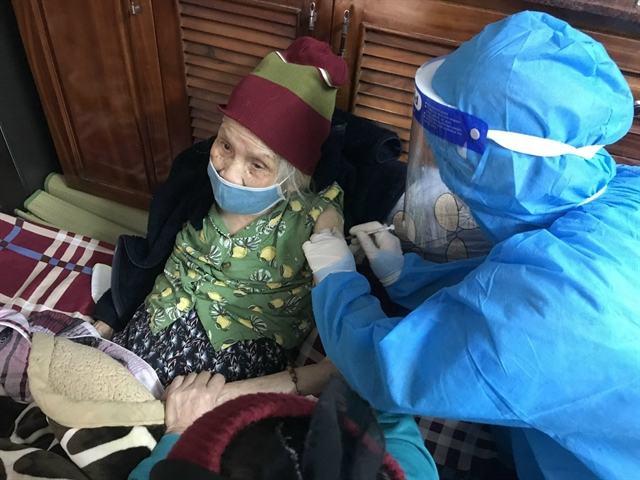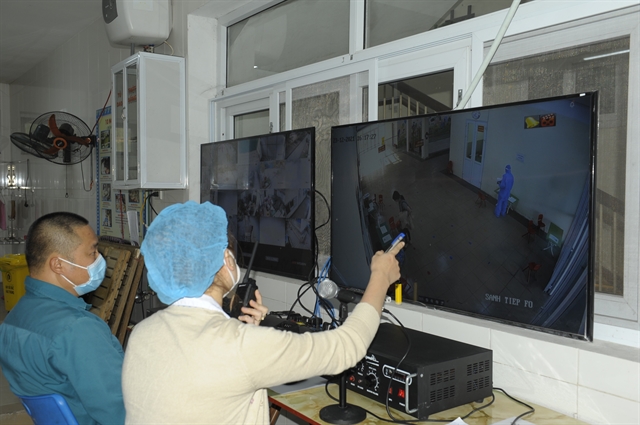 Society
Society

Hà Nội is now the epicentre of COVID-19 in Việt Nam with thousands of new patients every day. In response, mobile medical stations have been set up to reduce pressure on hospitals.

|
| A mobile medical station volunteer in Ba Đình District vaccinating an elderly woman at home. — VNA/VNS Photo Mạnh Khánh |
HÀ NỘI — Hà Nội is now the epicentre of COVID-19 in Việt Nam with thousands of new patients every day. In response, mobile medical stations have been set up to reduce pressure on hospitals.
Ready to work
In the small alleyways of Vĩnh Phúc, Ngọc Khánh and Liễu Giai wards of Ba Đình District, volunteers wearing protective clothes are busy with their work.
They come from all backgrounds; women, young people and war veterans all volunteering to work at mobile medical stations. They bring food, medicine and COVID-19 tests kits to support residents.
D.K.T, 40, of Newteco residential quarter in Vĩnh Phúc Ward, tested positive on January 1. His condition worsened on January 7. His family were worried and in a panic, calling everywhere for help.
Twenty minutes later, two volunteers came armed with medical equipment and oxygen bottles. Thanks to their emergency help, T. gradually stabilised and was moved to an upper-level hospital.
Ngô Thùy Linh, a member of the Vĩnh Phúc Ward’s mobile medical station, said the ward has provided treatment for COVID-19 patients at home since December 20 last year. Since then, hundreds of patients have been treated at home, thanks to the volunteers toiling day and night to help residents.
Every day, members of the mobile stations visit homes to deliver medicine and help patients if they have difficulty breathing or a decreased amount of oxygen amount in their blood.
“Our work is full of danger but no one hesitates. We are ready to come whenever patients need,” she said.
In Ngọc Khánh Ward, the mobile medical station was established on December 9 - it was the first of its kind in Ba Đình District. By Sunday, the station had treated nearly 500 patients.
Lê Ngọc Thắng, a volunteer at the station, said the team has been working all hours of the day. Every member is clearly assigned a task to streamline their work.
“All of us are happy and ready to overcome any difficulty. We work with all our hearts to give careful treatment to patients,” he said.
In other districts, such as Thanh Xuân and Đống Đa, hundreds of patients have also received support from mobile medical stations.
Nguyễn Thị Hiên, a relative of a COVID-19 patient in Đống Đa District, said many patients felt embarrassed at first.
“Volunteers always advise patients to reduce their stress, contributing to better treatment,” she said.
Life is giving

|
| The Phúc Lợi Ward mobile medical station in Long Biên District utilises technology to manage COVID-19 patients. — VNA/VNS Photo Mạnh Khánh |
Tạ Nam Chiến, chairman of the Ba Đình District People’s Committee, said all of the mobile medical stations volunteers feel the responsibility of supporting their community.
According to the Hà Nội Department of Health, since mobile medical stations were founded in the capital city, more than 2,600 volunteers registered to work.
Their work includes inputting data, giving guidance to patients at home, taking samples for tests and supporting vaccination.
Nguyễn Thị Phương Hoa, 26, is a pre-school teacher. While her students have not come back school due to COVID-19, she volunteered to work for the COVID-19 mobile medical station of Yên Thường Commune in Gia Lâm District.
Being the only woman in the station, Hoa was assigned lighter work. Every day, she received goods and food from residents to give to people being quarantined at the station.
“My work is easy but there are still risks. I am still determined to work,” she said.
Ngô Văn Được and Nguyễn Văn Khanh are both war veterans. They are volunteering to work for the Dương Xá District’s mobile medical station.
“We worked in battlefields during the war. We understand the value of life so we volunteered to work here. We want to contribute our little part in the battle against the pandemic,” said Khanh.
Chairman of the Hoài Đức District People’s Committee Nguyễn Hoàng Trường said that the district took advantage of community houses, schools and apartments to set up mobile medical stations to actively cope with the complicated COVID-19 situation.
The stations ensure that patients do not have to travel far for treatment while easing pressure on hospitals, he said.
There are now 508 mobile medical stations in Hà Nội across every district.
Director of the Hà Nội Department of Health Trần Thị Nhị Hà said despite obstacles, workers at the stations are flexibly adapting to the situation.
An important role
The Hà Nội People’s Committee on December 17 issued a direction about strengthening solutions for COVID-19 prevention and control during the Tết holiday, stressing the role of grassroots medical forces and mobile stations.
After supervising and checking the work of patient treatment, Deputy Minister of Health Đỗ Xuân Tuyên praised the work of mobile stations in Hà Nội.
The stations helped reduce overcrowding in hospitals and limited the number of patients at collective quarantine centres, reducing the risk of cross-infection. Home treatment has also helped save on travel, meals and other services, he said.
Tuyên confirmed that the mobile medical stations are playing an important role in the city's response to the ongoing COVID situation.
The Government has always maintained that medical force at a grass-roots level is the foundation of the national medical system. Especially now, grassroots medical forces are on the frontline, close to residents and ensuring their health is taken care of at home.
The Ministry of Health will work with the Government to plan for improving the capacity of medical forces at a grassroots level.
Deputy Minister Tuyên said that if cases in Hà Nội continue to increase, even above 4,000 a day, mobile medical stations will still be able to manage and be effective.
Now that most residents of Hà Nội have received two doses of vaccine, they will have lighter symptoms if they test positive. Mobile stations can continue to give them consultancy and treatment at home.
Tuyên said that the stations should improve information technology applications to further improve their work. — VNS